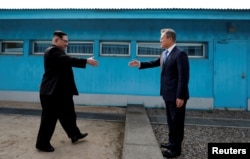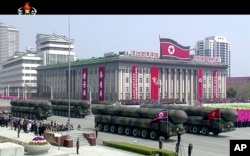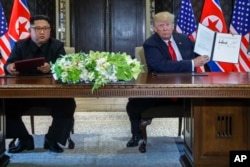North Korean leader Kim Jong Un will host South Korean President Moon Jae-in as the pair meet for their third inter-Korean summit September 18-20 in Pyongyang. The forthcoming summit was preceded by two other events on the peninsula this week: working level military talks and the opening of a joint liaison office - the fruits of the initial inter-Korean summit.
Thursday, South Korea's special adviser to the president for unification, foreign affairs and national security, Moon Chung-in, told reporters he personally believes the correct context in which to view the meeting is as an extension of the April 27 summit, which resulted in the Panmunjom Declaration.
Moon, who said he was speaking as an expert and not on behalf of the Seoul government, said he expects the South Korean president to place his focus on the denuclearization of the Korean Peninsula and “play the role of facilitator or mediator between Pyongyang and Washington” and promote dialogue between the two countries.
President Moon “believes that improved inter-Korean relations have some role in facilitating US-DPRK (North Korea) talks and solving the North Korean nuclear problem,” he said.
Commitment to denuclearize?
Visiting research fellow Cheon Seong Whun, with the Asian Institute for Political Studies, told VOA there is fundamentally one issue the international community needs to focus on at the summit.
He said that is if Kim Jong Un “is really willing to give up nuclear weapons in totality and return to the non-nuclear proliferation treaty (NPT) as a non-nuclear weapons state.”
Cheon said after two inter-Korean summits and the Singapore summit with U.S. President Donald Trump, “It’s not crystal clear that Kim Jong Un and [the] North Korean regime is willing to give up all those nuclear weapons and programs.”
However, the Institute for Far Eastern Studies at Kyung Nam University’s Professor Kim Dong-yub said denuclearization is not the focus of the upcoming summit.
“President Moon Jae-in said the goal of this inter-Korea summit is terminating military conflict between North and South and war threats during the cabinet meeting,” said Kim.
In his opinion, the bulk of discussions will focus on military issues.
New line of communication
Friday’s opening of a joint inter-Korean liaison office in Kaesong was one of the measures outlined in the April 27 Panmunjom Declaration.
The benefit of establishing the joint liaison office, said Moon Chung-in, is that it allows for direct communication between North and South Korea.
A presidential office spokesman said after the facility opened, “there is a stout bridge connecting two Koreas.”
The staff “in the liaison office will be there as a family, whether they are from North or South,” the spokesperson said, adding, “I look forward to seeing this harmony will be expanded from Kaesong to overall Korea Peninsula.
However, the true benefit of the office won't be realized for some time, said Lee Kyu-chang, Senior Research Fellow, Unification Policy Research Division, at Korea Institute for National Unification.
“As we establish the trust step by step, it will get a fruitful outcome,” said Lee.
He noted that while it’s expected the liaison office will take on a number of roles, its exact role will be finalized after a “full agreement” with North Korea has been reached, but it will primarily facilitate consultation between the two countries.
A call for ‘bold’ actions
Tuesday, Moon Jae-in said U.S. President Donald Trump and North Korean leader Kim Jong Un would need to take "bold decisions" to achieve denuclearization on the Korean Peninsula.
“North Korea should abolish its nuclear programs, and the United States should foster such conditions with corresponding action, said Moon.
His remarks came after the White House announced that Trump received a letter from Kim asking for a second meeting, although White House Press Secretary Sarah Huckabee Sanders said the administration will not “release the full letter unless the North Korean leader agrees that we should.”
Washington and Pyongyang have been discussing North Korea's nuclear programs since a landmark meeting between Trump and Kim in Singapore in June.
Sanders said a second summit with Kim “is something that we want to take place” and are “currently working to make happen.”
In the Thursday briefing to reporters, Moon Chung-in said if he could advise Kim Jong Un during the summit, he would suggest the North Korean leader take the initiative with his own bold move.
That would entail North Korea surrendering 15-20 nuclear warheads and missiles in return for Washington lifting economic sanctions, or at least the establishment of a liaison office with Pyongyang, and an end of war declaration.
Lee Ju-hyun contributed to this report.







